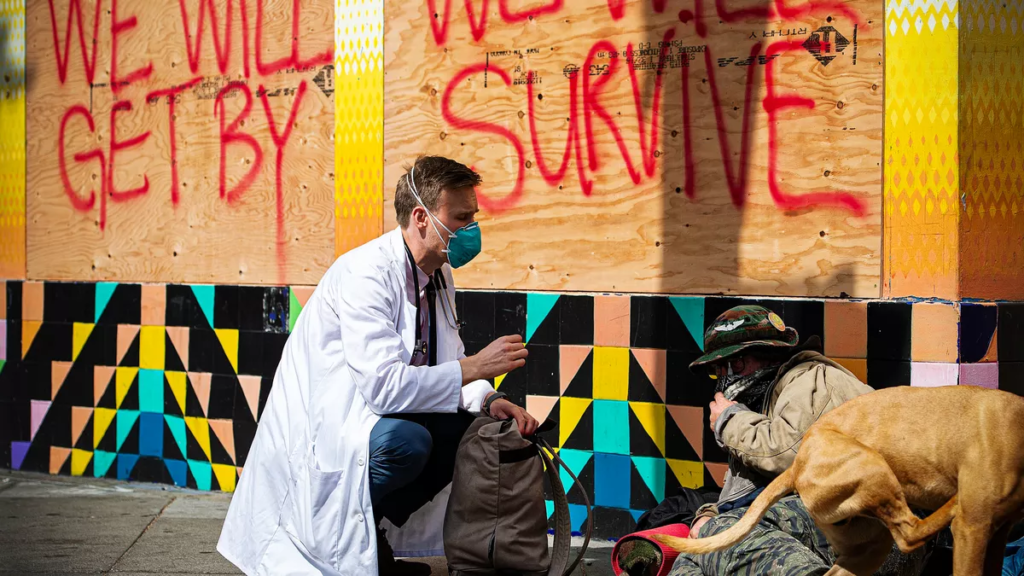Last week, The North Wind published an editorial, titled “Are Students Getting the Short End of the Stick?” This struck me as lacking careful consideration or curious compassion. I can hardly think of a large demographic generally less vulnerable than 18-24 year-old Westerners with access to a college education.
I feel I have to suggest and remind the readers that no individual is their demographic; every person is affected in their particular way by the crisis at hand, and I cannot empathize with any who are benefitting in these dire times.
I appreciate fully that there are college students within the aforementioned age range suffering immensely, no doubt. If you are individually in need, the world should congregate to help. However, the thrust of my critique of The North Wind’s article is that out of any demographic, 18-24 year-old college peers are among the most capable to recover from this crisis and are the most capable in offering help to others who are in the most need.
The North Wind’s Features Editor Maggie Duly wrote a separate article titled, “Most Students Ineligible for Stimulus Check,” which I thought gave a terse and clear breakdown of who is getting aid and why. She pointed out correctly that students will get a form of targeted help in the deferment of student loan payments. So the line in The North Wind’s article that reads, “There needs to be a more coherent response to this crisis for those in the 18-24 age range.” struck me as off because there seems to me like a very clear response for those who are in need in that demographic.
Additionally, the article read that, “Many are still claimed as dependents and not covered by the stimulus checks passed by the government,” which is precisely why they are not getting stimulus checks. I don’t see the incoherence there. People who are dependent (on others for their livelihood) are still going to be dependent on others. Those heads-of-the-household are the ones who will get stimulus to hand down to their dependents, if they do so choose.
In addition to Duly’s article, she also pointed out correctly that unemployed individuals (students or not) will see increased benefits, and those students who in fact are legally independent will be offered up to $1,200.
The question The North Wind posed, “This is a tough time for everyone, but as students in particular, we can’t help but question if the recent stimulus check was an oversight on the government’s part. Are students and other vulnerable Americans left uncovered?” displays the core of where I disagree. I’m not particularly interested in playing measuring games with demographic vulnerability, but after being taken aback by that line, I sat and wondered to myself, “What demographic is less vulnerable than 18-24 year-olds with an avenue to college education?” By my estimations, this demographic is among the very most resilient to this crisis.
Purely looking at age groups, 18-24 year olds are among the least susceptible to the virus. In Washington state, for example, 27% of the cases were 20-29 year-olds, but accounted for not even 1% of deaths.
According to the CDC, COVID-19 fatality rate among 20-54 year-olds was less than 1% and there have been no deaths of persons less than 19, as of March 26. Whatever the current numbers and from whatever source, it looks to me that the young adult demographic is the least at risk of hospitalization or death, and I don’t know how to put a price on not dying.
Speaking of putting a price on things, imagine being a 65-year-old who, at about 53, suffered savings losses in the 2008 financial crisis, and now coming on retirement age, has to sail through another crisis on the horizon, but this time, one with a good risk of hospitalization and death.
Young people don’t have much in savings, and if they do, they have another four decades to rebuild it. These 65-year-olds were young once, but now do not have time to rebuild their savings.
Let’s consider the demographic for the ages 18-24 who attend college. According to the Center for Education Statistics, about 40% of these young people attend a two or four-year college, leaving 60% who do not. I personally have worked a fair share of hard labor with this age group in that 60% and it’s been illuminating to my perspective to see the wide variety of reasons they do not or cannot. Because of ability, access to resources, or whatever the cause, people who are not attending college tend to be not as wealthy or vocationally mobile as those who do.
Many factors explain that those not in higher education are more vulnerable, less privileged, more at risk from the factors of this crisis, than those who are in higher education. Being a college student, for job training and signalling presumably, is tantamount to being vocationally mobile. This, along with having so many years ahead of them, puts young people in college at a very flexible position to adapt to the outcomes of this crisis.
On average, families with children attending college are indisputably more educationally privileged than those who do not. To be clear, NMU is not an institution like Colorado College, for an example, where the median family income of its students is almost $280,000. NMU has a modest $76,400-estimated median family income, but the median income of the United States is about a full $20,000 less, at $56,516, according to www.equality-of-opportunity.org. Even here at this affordable, modest, institution of NMU, the average family with a child in college is doing much better economically than the national average family.
The topic that NMU Think Tank was discussing right before quarantine was the Moria refugee crisis in Lesbos, Greece. I don’t intend to extend my scope internationally when talking about national economic policy, but those are the types of people who are at the top of my mind when thinking about those suffering and in need of relief.
Like America’s homeless, with limited opportunities even before the crisis, with insufficient shelter, food and hygiene. Then I consider the 65-year-olds or older who are susceptible to the virus, and whose life savings are in jeopardy (again), or 80-year-old retirees, or low-income youths without college access and lower vocational mobility, and so on.
If there is a “stick to get” with this crisis and the resultant government intervention, 18-24 year-old, legally dependent, college students aren’t getting the short end of it; they are already getting support in deferred student loans and other measures anyway.
Even if they are getting the short end of some particular economic stimulus, I don’t see how they need the long-end of it more than hardly any other demographic. College-educated young people should get ready to use their blessings of youth and education to start working and volunteering, wherever they’re needed, to help recover this world out of this crisis for the good of the vast majority of people nationwide and internationally who have it worse off than they do.
Most young college students certainly shouldn’t be anywhere near the start of the line for government aid, and if last week’s article was meant to just be a general lament that the government isn’t efficient at giving aid, then I wholeheartedly agree.

























